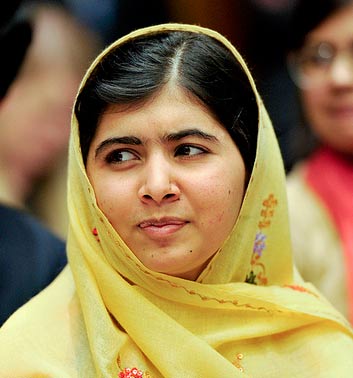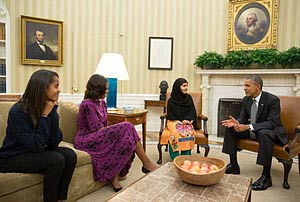Malala Yousafzai Biography
 Malala
Yousafzai is a Pakistani school pupil and spokesperson for women’s
right to education. In retaliation for her high profile campaign for
education and criticism of the Taliban, she was shot in the head at
close range by a Taliban gunman. She survived the gunshot wound and has
become a leading spokesperson for human rights, education and women’s
rights. She has received numerous peace awards, and was the youngest
person to be nominated for the Nobel Peace Prize in 2013.
Malala
Yousafzai is a Pakistani school pupil and spokesperson for women’s
right to education. In retaliation for her high profile campaign for
education and criticism of the Taliban, she was shot in the head at
close range by a Taliban gunman. She survived the gunshot wound and has
become a leading spokesperson for human rights, education and women’s
rights. She has received numerous peace awards, and was the youngest
person to be nominated for the Nobel Peace Prize in 2013.Early Life Malala
Malala was born (12 July 1997) in Mingora, the Swat District of north west Pakistan to a Sunni Muslim family. She was named Malala, which means ‘grief stricken’ after a famous female Pashun poet and warrior from Afghanistan.Her father, Ziauddin Yousafzai is a poet, and runs a chain of public schools. He is a leading educational advocate himself. In 2009, she began writing an anonymous blog for the BBC expressing her views on education and life under the threat of the Taliban taking over her valley. It was her father who suggested his own daughter to the BBC. She wrote under the byline “Gul Makai”
During this period, the Taliban’s military hold on the area intensified. At times, Malala reported hearing artillery from the advancing Taliban forces. As the Taliban took control of the area they issued edicts banning television, banning music, and banning women from going shopping and limiting women’s education. Many girls schools were blown up and as a consequence pupils stayed at home, scared of possible reprisals from the Taliban. However, for a time, there was a brief respite when the Taliban stated girls could receive primary education, if they wore Burkhas. But, a climate of fear prevailed and Malala and her father began to receive death threats for their outspoken views. As a consequence, Malala and her father began to fear for their safety. Her father once considered moving Malala outside of Swat to a boarding school, but Malala didn’t want to move.
” I don’t know why, but hearing I was being targeted did not worry me. It seemed to me that everybody knows they will die one day.” I am Malala p.188When her father suggested they stop their campaigns for human rights, Malala replied
“How can we do that? You were the one who said that if we believe in something greater than our lives, then our voices will only multiply ever if we are dead. We can’t disown our campaign!’ I am Malala p.188After the BBC blog ended, Malala featured in a documentary made by New York Times reporter Adam B.Ellick. She also received greater international coverage and her identity about writing the BBC blog was revealed. In 2011, she received Pakistan’s first National Youth Peace Prize and she was nominated by Archbishop Desmond Tutu for the International Children’s Peace Prize. Her increased profile and strident criticism of the Taliban caused Taliban leaders to meet, and in 2012, they voted to kill her.
People were asking me to speak at events. How could I refuse saying there was a security problem? We couldn’t do that, especially not as proud Pashtuns. My father always said that heroism is in the Pastun DNA. I am Malala p.180
On 9 October, 2012, a masked gunman entered her school bus and asked “Which one of you is Malala? Speak up, otherwise I will shoot at you all.”
Malala was identified and she was shot with a single bullet which went through her head, neck and shoulder. Two other girls were also injured, though not as badly as Malala.
Malala survived the initial shooting, but was in a critical condition. Her father was convinced she would die and told the village to prepare for her funeral. Her critical organs were failing and she developed an infection. In a coma, she was moved to a hospital in Rwalpindi. Later on the 15 October she was moved to Birmingham in the United Kingdom for further treatment at a specialist hospital for treating military injuries. A couple of days later, she came out of a coma and responded well to treatment. She was discharged on January 3, 2013 and moved with her family to a temporary home in the West Midlands. Writing in her book “I am Malala” she writes.
“It was a miracle I was alive” (p.237)She also writes about her lack of bitterness or desire for revenge.
“My only regret was that I hadn’t had a chance to speak to them before they shot me. Now they’d never hear what I had to say. I didn’t even think a single bad thought about the man who shot me – I had no thoughts of revenge – I just wanted to go back to Swat. I wanted to go home” I am Malala p.237
Response to Assassination attempt
Her assassination received worldwide condemnation and protests across Pakistan. Over 2 million people signed the Right to Education campaign. The petition helped the ratification of Pakistan’s first right to education bill in Pakistan.Ehsanullah Ehsan, chief spokesman for the Pakistani Taliban, claimed responsibility for the attack, saying that Yousafzai was a symbol of the infidels and obscenity. However, other Islamic clerics in Pakistan issued a fatwa against the Taliban leaders and said there was no religious justification for shooting a schoolgirl.
United Nations petition
On 15 October, UN Special Envoy for global education, Gordon Brown, visited Malala whilst she was in hospital and launched a petition in her name – ‘In support for what Malala fought for.’Using the slogan “I am Malala” the petition contains three demands
- We call on Pakistan to agree to a plan to deliver education for every child.
- We call on all countries to outlaw discrimination against girls.
- We call on international organizations to ensure the world’s 61 million out-of-school children are in education by the end of 2015.
On 12 July 2013, she spoke at the United Nations to a group of 500 youths calling for worldwide access to education.
“I am not against anyone, neither am I here to speak in terms of personal revenge against the Taliban or any other terrorist group. I’m here to speak up for the right of education for every child. I want education for the sons and daughters of the Taliban and all terrorists and extremists.” (BBC Link of speech)
 Her
global fame and admiration in the West has caused something of a
backlash in Pakistan. Many in Pakistan fear the West’s support of Malala
is hypocritical given the US drone strikes on Pakistan and Afghanistan.
Also, her plight highlights the unchecked militancy of the Taliban,
which is a problem for Pakistan. Some in Pakistan fear Malala is
promoting a Western agenda. However, on her part, Malala is dismayed by
conspiracy theories in her own country and is keen to portray her native
Pakistan in a good light. Her BBC blog expresses such a sentiment.
Her
global fame and admiration in the West has caused something of a
backlash in Pakistan. Many in Pakistan fear the West’s support of Malala
is hypocritical given the US drone strikes on Pakistan and Afghanistan.
Also, her plight highlights the unchecked militancy of the Taliban,
which is a problem for Pakistan. Some in Pakistan fear Malala is
promoting a Western agenda. However, on her part, Malala is dismayed by
conspiracy theories in her own country and is keen to portray her native
Pakistan in a good light. Her BBC blog expresses such a sentiment.…I immediately saw images of Pakistanis fill my screen. Not the usual rock hurling Pakistanis, irrationally shouting amidst flaming tyres, but gentle candle-lighting, beautiful Pakistanis with words of love and peace on their lips. It was UN International day of the Girl Child and the BBC chose to illustrate this with a story of what they termed a National Awakening in Pakistan, following the shooting of 14-year-old school girl, Malala Yousafzai. I was delighted at the apparent 24 hour flip from a narrative of “those Pakistanis are so barbaric they shoot their own school girls” to one of hope, resilience, and a more accurate reflection of the millions who reject such an act. (5 February, 2013)
Further Quotes by Malala
“Today we all know education is our basic right. Not just in the West; Islam too has given us this right. Islam says every girl and everybody should go to school. In the Quran it is written, God wants us to have knowledge.” I am Malala p.263
“One child, one teacher, one pen and one book can change the world. Education is the only solution. Education first.”- UN Speech, July 12, 2013
“I love my God. I thank my Allah. I talk to him all day. He is the greatest. By giving me this height to reach people, he has also given me great responsibilities. Peace in every home, every street, every village, every country – this is my dream. Education for every boy and every girl in the world. To sit down on a chair and read my books with all my friends at school is my right right. To see each and every human being with a smile of happiness is my wish. I am Malala p 265
“I am Malala, My world has changed by I have not.” p.265

No comments:
Post a Comment